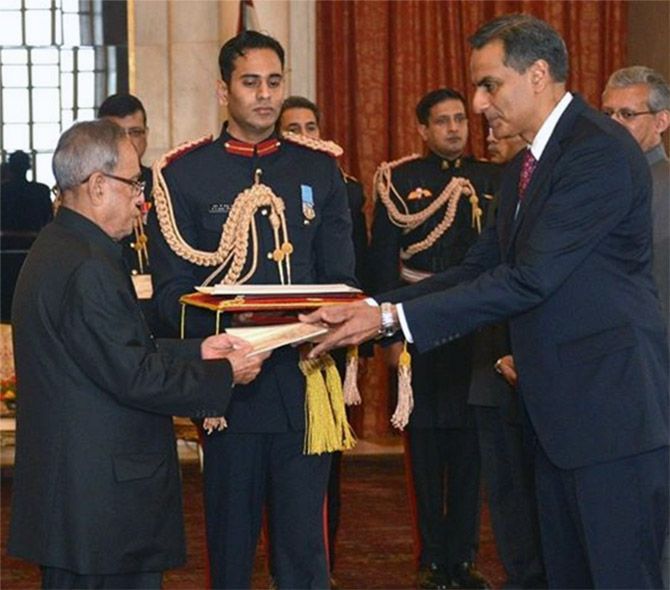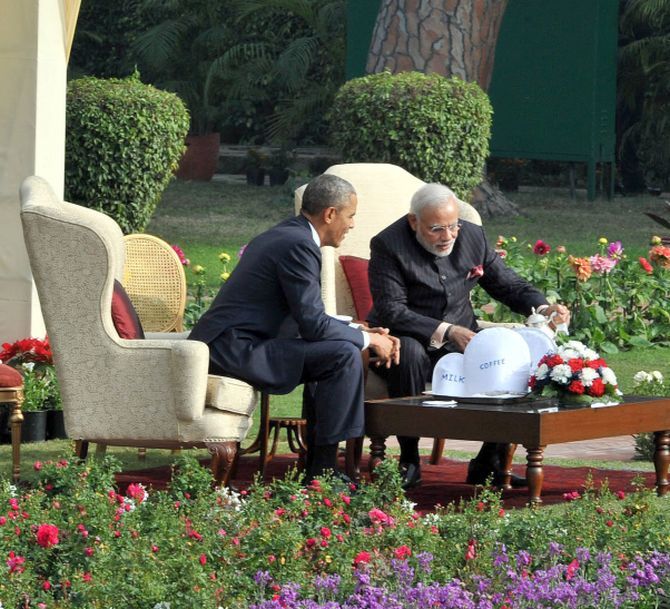'I am propelled each day by the thought of my parents and what they went through -- the hard work, the struggles, the risks that they took -- so that I could do something like this...'
'It was the commitment to the nuclear deal of the two leaders that tried to solve this that made all the difference.'
'This is a relationship that matters in so many ways and we are going to get it right,' US Ambassador Richard Rahul Verma tells Aziz Haniffa/Rediff.com in an EXCLUSIVE interview.

Since taking over as the first Indian American to be appointed US Ambassador to India, Richard Rahul Verma made his first visit back to Washington, DC for the chiefs of mission conference.
In a wide-ranging, in-depth, exclusive interview to Aziz Haniffa/Rediff.com, the ambassador spoke of President Obama's India visit in January, the nuclear deal and the prognosis for increased US-India trade and investment.
Part I of a Rediff.com exclusive!
You literally had to hit the ground running -- so, how has the experience been in these three months? I remember you joked at your swearing-in that when people would ask about your goals when you get to India, you would say just to survive the first month or two.
It has really been a fantastic first three months. First, I would say, we have a terrific team -- at the embassy and at the consulates. We continue to attract the best talent from across the US government, from the State Department and all of our agencies that are there. And, so, that makes a big difference.
Secondly, we've had an incredibly warm welcome by the people of India and by the government officials. They've just been so wonderfully warm and welcoming to me and my family and I've appreciated that so much.
And, thirdly, the visits have been so important because what they do is -- they create a lot of work, but they create openings for us to get a lot of work done after the visit.
Within the first five days I was there, Secretary Kerry was there for Vibrant Gujarat, and that visit was important, not just because of Vibrant Gujarat itself -- which was very important -- but because he was also laying the groundwork for the President's visit.
So, we were able to get some things done through that visit -- and Assistant Secretary (of State for South and Central Asian Affairs, Nisha) Biswal and others were there. So, it was a very important scene-setting for the President's visit.
And then, of course, to have the President there, two weeks later, with John Podesta, with Raj Shah, with Susan Rice, with Mike Froman, with Secretary Pritzker, this was an all-star line-up and they were there for a reason.
They were there because a very deliberate decision had been taken, that this is a relationship that matters in so many ways and we are going to get it right.
There is a resurgence in the interest in the ties, in the connections, and so, that visit was followed quickly by Secretary Lew.
In April, we have a whole other string of visitors, including the Secretary of Transportation, the Secretary of the Navy, and the list goes on and on.
These aren't coincidental. These are very deliberate and purposeful trips taken by senior officials in our government, who know that India is part of our strategic and economic and diplomatic future.
I am sure, when you have a moment to reflect there is the emotional aspect. As Secretary Kerry said at your swearing-in, it spoke to 'representing of a homecoming of enormous consequences,' and explained that your parents half a century ago had left their beloved India to build a life in the US.
And, then he said, 'Today, we return the favour by sending a new generation of Vermas to India.'
I am propelled each day by the thought of my parents and what they went through -- the hard work, the struggles, the risks that they took -- so that I could do something like this.
I say to students and young people, and even larger groups, when I talk to them, I say the odds that I would stand in front of you today as the US Ambassador are so small given all the things that had to line up for this to happen.
But it's an immigrant story, it is an American story, and those kinds of stories are now being told and have been told for generations by other ethnic groups.
I am really so fortunate and I've told you this Aziz before so many times, that I am the beneficiary of so many other people and the work that they have done.
But, yes, (it is) very emotional, very gratifying. And, then, you realise you have a lot of work to do too.
It is a terrific blend of professional and personal experiences coming to bear in this job.

Perhaps the seminal issue is the nuke deal, which was in limbo for over six years. Although the policy framework may have been resolved and the ball now seems to be in the court of the companies, how come they are not enthused?
This is what Congressman Ed Royce told me, that this liability issue is still a major source of concern. Are you convinced that operationalisation and commercialisation is on tap?
I believe we've made very significant progress. This isn't like you sign one agreement and you've done with this issue.
This is an issue that will have to continue to be worked very carefully by the Contact Group, by the two governments, because as you know, the US government is not the provider of the reactors or the nuclear power.
This will be done by private companies. And what private companies want are sufficient legal assurances that the India liability scheme will be consistent with international practice.
Now, what we've done -- and the reason why we think this was a breakthrough -- is because we were able to get assurances over these three months, three-city process of the Contact Group that the Indian regime was to channel liability to the operator.
That they would provide this analysis to us in writing, that they would ratify the treaty as another means of showing their consistency with the regime. And in addition, they've answered before Parliament.
And so, what we are seeing is a number of different steps and assurances that they've provided that in addition to the insurance pool -- to the extent that there is still liability confronting suppliers -- that it is this combination of assurances that we hope will allow companies to come forward and to begin to start the process of providing power in a way that is responsive to Indian needs.
Now, we'll have to see, whether the assurances that have been provided are sufficient. As we've said, we'll continue to work with the companies, work with the Indian government, because ultimately, the proof of success will be when the companies come forward and actually sign the contracts with the Government of India through their NPCIL (Nuclear Power Corporation of India) and ensure that those contracts have the terms in it that reflect this channeling of liability.
So, we still have a way to go, but certainly we came a long distance from the protracted kind of stalemate that we had been in for five and six years.
Was it essentially because the president and the prime minister said, 'This has been in limbo for too long, let's get it going'?
Absolutely.
You know a lot of people like to focus on the president's visit in January, which was exceptionally important, but you have to go back to the September visit of the prime minister when he came to Washington and the two leaders agreed that this had been an irritant and a stumbling block for too long.
Let alone it has prevented India from developing a source of non-carbon based power for the 300 million Indians that lack access to electricity.
I mean, stepping back, the Indian side was not achieving what it needed to do, which was try to generate more electricity in a non-carbon intensive way and the US was really acting in a leadership role on behalf of many different countries, and frankly, Indian companies, who were concerned about the law.
It was the commitment of the two leaders that tried to solve this that made all the difference.
Arvind Subramanian, the chief economic adviser to the Government of India, said it was unreasonable to expect big bang reforms.
What's your take on that because everyone has been looking for these reforms? After all, it was the Budget of the reform-minded prime minister.
I think sometimes we don't take a step back to look at the positive trajectory that we've seen in trade and investment and economics. You know the figures.
Ten years ago, I think the amount of two-way trade was less than $10 billion. It is now in excess of $100 billion.
Five years ago, we had probably -- almost virtually -- no defence sales to India. We are now north of $10 billion.
We had foreign investment numbers that were very low, we had export and import numbers that were very low. All those numbers are growing considerably.
You've been to Bangalore, you’ve been to Hyderabad, you can see the proliferation of American companies that employ hundreds of thousands of Indians.
Now, I would say, we also see Indian companies investing in the United States -- Indian companies helping to power American growth and job creation as well.
So, sometimes, we don't take a step back to look at the direction of the economic growth. Is it sufficient? It is not, and we can do so much better. That's why the president set this very ambitious target of $500 billion in two-way trade.
For that to happen, sectors need to continue to be open. We are encouraged by some of the recent developments. For example, the liberalisation of the insurance and pensions sector, that was important. We've seen it in defence, the opening of the market.
Opening up sectors, business certainty, legal and tax certainty, transparency, all of those issues matter. I will also tell you what is occurring as I travel around the country. You do see the states beginning to compete with each other to attract foreign investment -- talking about a single window for approvals, talking about the ease for getting land, the fairness of the court system. That's a good development.
That will be good for not only American investors and American companies, but all outside investors. Look, India needs outside investment to help power its growth story. I am actually optimistic on the economic and trade front.
Is there work to be done on intellectual property, on business certainty and fairness? There is, but I am encouraged by the dialogues we've had on intellectual property and we'll continue to raise concerns as they come up.
But again, we should be relatively pleased, but not satisfied about where we are, and again, I am optimistic about where things stand.
- Part II of the EXCLUSIVE! interview: 'Human rights, religious freedom are issues we are going to raise'










